unit6 英语泛读教程第三册
英语泛读教程3第三版 课文翻译(Text1--1-7单元)

UNIT 1 创造性思维的艺术约翰·阿代尔创造性对人类发展至美重要。
下面的文章里,约翰·阿代尔为求实的创造性思维者提供了一些颇有见地的见解和技巧。
创造性思维在今天的重要性不需要强调。
在你的职业中或工作领域,如果你能够发展提出新思想的能力,你就有竞争优势。
在你的个人生活中,创造性思维也能将你带上创新活动之路。
它可以丰富你的人生,尽管并非总是以你期待的方式。
人类创造力人类不可能凭空创造东西。
有一次,一位来宾极为仔细地参观了亨利·福特的汽车公司,然后见到了福特。
来宾心中充满了惊奇和崇敬,他对这位实业家说:“福特先生,25年前起家时几乎一无所有的人,不可能实现这一切。
”福特回答说,“这个说法可不太对。
每个人都是靠所有拥有的东西来起家。
这里什么都有——所需要的一切,它们的基本点和实质性的东西都已存在。
”潜在的材料,也就是可以做成或建构成某种东西的元素之成分或者实质的材料,都已存在于我们的宇宙。
你可能已经注意到,我们倾向于将创造性这个词用在与使用的原材料很不一样的产品上。
鲁宾斯的一幅名作,就是蓝色、红色、黄色和绿色的蠕虫般颜料在艺术家画板上的集合。
物质材料,对艺术家来说是颜料和画布;对作家来说是纸和笔——完全是次要的。
这里的创造,更多的是在大脑之中。
感知、思想和感觉都在一种观念或想象中结合起来。
当然,艺术家、作家或作曲家还需要使用技巧和技术,在画布或纸上把头脑中构想出来的东西塑造成型。
和普通意义上的创造性一样,创造性思维遵循同样的原则。
我们的创造性想象必须有可以加工的对象。
我们不能凭空产生新的思想。
如上面福特所说的那样,原材料都在那里。
有创造力的大脑在原材料中看到可能性和相关性,而创造力不强的大脑却看不到。
这一结论让我们大大地松了一口气。
你不用凭空构想新的想法。
作为创造性思维者,你的任务是将已经存在的想法或元素组合在一起。
如果最终把人们从未想过可以联系起来的想法或事物,用看似不可能却很有价值的方式组合起来,那人们就会认为你是创造性思维者。
大学英语泛读第三册课后翻译~~(6单元之后的)
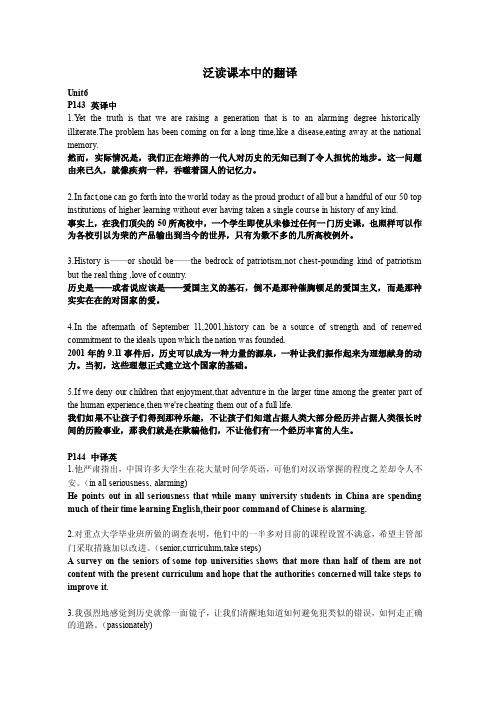
泛读课本中的翻译Unit6P143 英译中1.Y et the truth is that we are raising a generation that is to an alarming degree historically illiterate.The problem has been coming on for a long time,like a disease,eating away at the national memory.然而,实际情况是,我们正在培养的一代人对历史的无知已到了令人担忧的地步。
这一问题由来已久,就像疾病一样,吞噬着国人的记忆力。
2.In fact,one can go forth into the world today as the proud product of all but a handful of our 50 top institutions of higher learning without ever having taken a single course in history of any kind.事实上,在我们顶尖的50所高校中,一个学生即使从未修过任何一门历史课,也照样可以作为各校引以为荣的产品输出到当今的世界,只有为数不多的几所高校例外。
3.History is——or should be——the bedrock of patriotism,not chest-pounding kind of patriotism but the real thing ,love of country.历史是——或者说应该是——爱国主义的基石,倒不是那种催胸顿足的爱国主义,而是那种实实在在的对国家的爱。
4.In the aftermath of September 11,2001,history can be a source of strength and of renewed commitment to the ideals upon which the nation was founded.2001年的9.11事件后,历史可以成为一种力量的源泉,一种让我们振作起来为理想献身的动力。
大学英语泛读_第三册_答案

大学英语泛读第三册答案Unit OneLesson 13. 1) 废话连篇的人毕竟是个例,不是惯例,我们姑且不谈他们。
可是还有些人,他们说话或说明某些事情的时候,简直不知道什麽时候适可而止。
2)他们急于证明自己的观点,不知什麽时候该打住。
他们似乎以为听众如此低能,以至于听不懂最简单的事,每件事都要多次重复才能灌输到头脑里去。
3)那些有口才的人总是讨人喜欢,随时随地受欢迎他们是聚会和社交场合的中心人物。
4)我想自己掏钱补上差额再简单不过了,肯定事后他还会给我的。
所以,我没有回去向他要钱。
但是,我很快发现我是大错特错了5)辩白使我酿成大错,而沉默使我不可救药。
6)我被施予局部麻醉,好像麻醉没有完全发挥作用,于是我对给我做麻醉的护士诉说,但她不容分说,她说她知道该怎麽做,叫我不要过分挑剔。
7)医生提醒我说会有点疼,因为再打一针麻药是不可能的。
Learning to use phrases and expressions from the text1. 1) obvious 2) fares 3) administer 4) to summon 5) revived6) dose 7) trivial 8) is associated with 9) elaborate 10) repetition2. 1) A) to add to an amount required 补足B)to invent (a story) 编造C) to end a quarrel and become friends again 和好D) to form or constitute 构成2)A)the outside limit of an area (床)边B) nervous 紧张不安C) a slight advantage 微弱的优势D) to move slowly and carefully in a particular direction 挤(过)3) A) (obtained) from 靠从事……..B) from a particular number 从……..中C) without 失去D)because of 出于3. 1)Teenage readers felt he was on their side against their parents and teachers. Older readers felt he was on their side against their bosses at work.2) Many people are uneasy in the company of strangers.3) If you follow these instructions to the letter you will succeed in this task.4) He tends to get a bit carried away when he’s dancing and he starts spinning and leaping all over the place.5) That’s out of the question: Mary is much too busy to look after her children.6) I had a lot of quarrels with my parents when I was a teenager.Lesson 22. 1) 他意识到,仅仅阅读那些信件就得用去他一天的大部分时间,何况每天早晨同样又有一堆信件会出现在他的面前。
unit6 英语泛读教程第三册
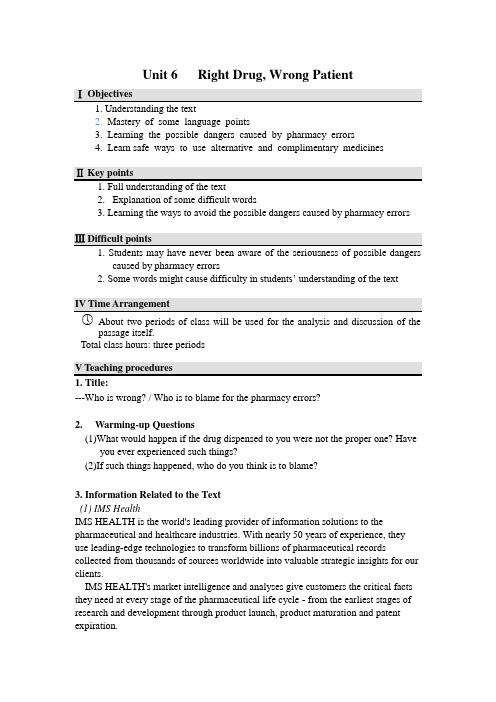
Unit 6 Right Drug, Wrong Patient2. Mastery of some language points3. Learning the possible dangers caused by pharmacy errors4. Learn safe ways to use alternative and complimentary medicines2.Explanation of some difficult words3. Learning the ways to avoid the possible dangers caused by pharmacy errorscaused by pharmacy errors2.Some words might cause difficulty in students’ understanding of the textAbout two periods of class will be used for the analysis and discussion of the passage itself.Total class hours: three periods1. Title:---Who is wrong? / Who is to blame for the pharmacy errors?2. Warming-up Questions(1)What would happen if the drug dispensed to you were not the proper one? Haveyou ever experienced such things?(2)If such things happened, who do you think is to blame?3. Information Related to the Text(1) IMS HealthIMS HEALTH is the world's leading provider of information solutions to the pharmaceutical and healthcare industries. With nearly 50 years of experience, they use leading-edge technologies to transform billions of pharmaceutical records collected from thousands of sources worldwide into valuable strategic insights for our clients.IMS HEALTH's market intelligence and analyses give customers the critical facts they need at every stage of the pharmaceutical life cycle - from the earliest stages of research and development through product launch, product maturation and patent expiration.With more than 5,000 professionals in 100 countries - from Austria to Australia - from China to Costa Rica - from Saudi Arabia to Senegal - IMS HEALTH is a trusted healthcare-industry strategic partner, with thousands of customers and annual revenue in 2001 of $1.3 billion.(2) U. S. PharmacopeiaIn pursuit of its mission to promote public health, USP establishes state-of-the-art standards to ensure the quality of medicines for human and veterinary use. USP also develops authoritative information about the appropriate use of medicines. National health care practitioner reporting programs support USP's standards and information programs. In addition, USP supports many public service programs.(3) Careers in medicine in the USTo become a medical doctor in the US, one must attend four years of college and receive a bachelor’s degree, followed by four years of medical school. Then he becomes an intern in a hospital and receives supervised practical training. As an intern, he has to “make rounds” with other doctors, visiting hospital patients. He is supposed to help give special treatments and answer emergency calls in the hopital at any time of day or night. Finally he becomes a resident at a hospital. Like the intern, he learns by observing the work of others. But the resident has much more responsibility than the intern. He often assists experienced surgeons during operations. In an emergency, he may take over the work of the staff surgeon.Internship and residency combined take three to five years, depending on one’s area of specialization. Hospitals have several interns and many residents on their staff. A resident who is completing his residency period and who thereby distinguished himself is selected to be chief resident, a position of greater responsibility.(4) Three types of doctors1. General practitioners 全科医生2. Specialists3. Researchers4. Text analysis(1)Article Abstract:Drug-dispensing errors are a common occurrence, requiring customers to be vigilant when having their prescriptions filled at pharmacies. These errors are attributed to understaffing and the consequent increase in workloads in the retail drug industry, coupled with rising prescription volume. Tips on how one's family can be protected from pharmacy errors are presented.(4)passage divisionPart I (para.1-8) By giving examples and providing statistics, the author pointout the seriousness of the drug dispensing errors.Part I (para.9-31) Some ways on how to protect you family and yourself.5. Key words and phrases(1) pharmacy error/drug dispensing error(2) prescription(3) dose(4) awry(5) churn out(6) be attributed to(7) fatal (8)medical vendor(9) submit to(10) oversight(11) counsel(12) pharmacist(13) adverse effect(14) dearth6. Language Notes1. The new prescription that her mother, Peggie, had gotten filled at the Rite Aid in Rock Hill, S.C., was for Ritalin, a drug used to treat attention deficit-hyperactivity disorder.(新处方上开的药是"利他林",这是她母亲佩吉在南卡罗来纳州洛克山的"莱特相助"药店配的药,一种用来治疗注意力亢奋/不足的药。
泛读教程第三册参考答案
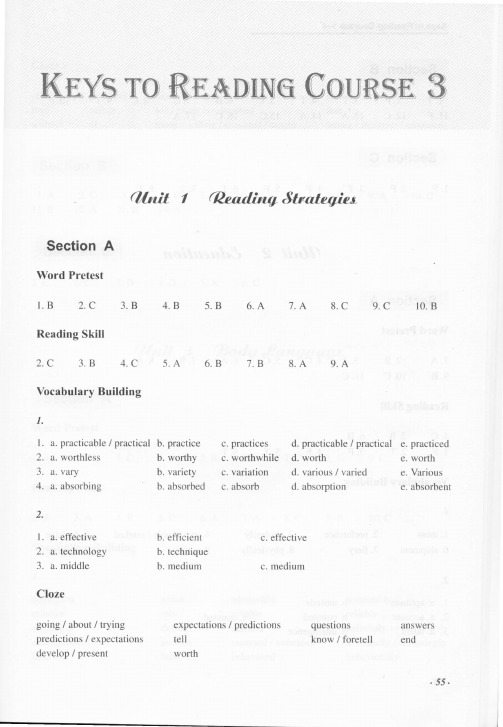
.犭 F.
κ eys to Reading Cou阝
es1-4
∷ ∷ 蛳
∷ ,∷
8.C 9.C 10,C
1,C 2,B 3.B 4。 B 5。 A 6。 C .7.B 11.C 12,B 13.A 14.C 15.C 16.B 17.A
∷ ∷ ∷ ∷ 蛳
1.B 2.B
∷ ∷∷ ,∷
3.C 4.A 5。 B 6,B 7.A 8,C 9.C 10,B
1ifc .62.
some
sort/1ond
space
orbiting`going/circling
asked/wOndcred
have
Keys tO Reading Course3
Ⅱ ving
were
be1ieve
lⅡ
oWn
living
solar
through
where
cly
∷ ∷sectlm∷ B∷ ∷
3.B 13.A
4.F 14.C
5,T 15.C
6.F
7.B
8.C
9.A
10.C
疵矿t
`诋2.F 1.F
3.T
4.F
5.F
6.F
7.T
8.T
9.F
10.T
叼 臼 匕 饪
5
砀
∷ ∷ 蛳
1.C 2.A
∷ ∷ ∷∷
3,A
4.B 5.C
`∷ Word PⅡ etest 6.A
7.C 8.C
9.C
・ 59.
κ ysto Rmdino Coumes1-4 ●
_∷ ∷∷∷ △ ∷
6助山£ 昭
t〃
匍 纽 饧 哆岛 咧 锄 泗
英语泛读教程3刘乃银Unit 6

3. Mistakes on the drug
Situation: 53% of pharmacists admitted having made errors in two months. Errors occurred nearly one a day. Reasons: the rising prescription & for the profit.
Step 1: Obtain an Undergraduate Degree (3-4) Medicine, chemistry, mathematics, biology and physics Step 2: Attend Medical School (4) 2--classroom and lab work in anatomy, physiology, microbiology, medical laws and ethics and pharmacology 2--clinical rotations, or clerkships, in different medical departments, allowing them to experience each area of medicine, and decide which area to specialize in
Hidden Dangers of OTC
1. OTC, over the counter, means the medicine the patient can buy without consulting a doctor. Generally speaking, OTC medicine has been proved safe after being used for a long history, and it is effective, not expensive, and convenient. So people easily take it for granted, trust its security.
泛读3-unit6Language

Phase 2. Old English
• In 410, the last of the Roman legions left Britain, which meant that the island was left open for attack or occupation by various tribes. • Anglo-Saxon Invasions: From about 449, these so-called Germanic tribes (the Angles, Saxons, Jutes )started attacking and migrating to Britain. As a group, they were called the Anglo-Saxons, who brought their language to Britain. This is language we now call Old English named after the tribe the Angles.
Unit 6
The Development oase 1. Pre-English Days
• -55B.C. There was no such thing as ‘English’ during this period. The inhabitants of Britain The inhabitants of Britain – the Britons (a tribe of Celts)– did not speak English, but various Celtic languages. • 55B.C.-410 A.D. The Roman Conquest bring the Latin Language to England
大学英语泛读教程3(第三版)课件Unit 6

A Do You Get It?
Multiple Matching
Reread the four passages (A-D) in the text.
Which of the four passages refers to … __B___ 1. extinct creatures? __C___ 2. two scientists? __B___ 3. written myths? __D___ 4. a survey? __C___ 5. an example? __C___ 6. an adaptation of a previous argument? __A___ 7. keeping children out of school? __B___ 8. marks caused by animals? __C___ 9. a comparison with a mechanical object? __B___ 10. a change of argument?
U6-p.61
Track 13
Complex Problem
A popular argument by people seeking to deny the validity of evolution is that humans are simply too complex to have evolved without some kind of creator lending a helping hand. This argument was first put forward in 1802 by the Christian philosopher William Paley, who used the analogy of a watchmaker. Something as complex as a watch, Paley argued, had to have a designer. A version of this idea was revived by creationists and is now referred to as the intelligent design argument. One proponent of this belief is the biochemist Michael Behe. In one of his books, Behe referred to the “irreducible complexity” of organisms like human beings. Such organisms are so sophisticated, the argument goes, that removing even one tiny element from them would cause them to malfunction.
英语专业泛读教程第三册单词汇unit6

英语专业泛读教程第三册单词汇Unit 6tongue [tʌŋ]n. 舌头;语言vt. 舔;斥责;用舌吹vi. 说话;吹管乐器mother tongue母语;本国语言tongue in cheek挖苦地;不是认真的native tongue母语tongue twister绕口令slip of the tongue口误;失言;小错误spoken language 口语,口头语言;出声语言written language 书面语;书面语言living language 活语言;现用语言received pronunciation (英语)标准发音Standard English 标准英语;常速英语;规范英语Queen's English 标准英语;规范英语artificial language [计] 人工语言cockney ['kɔkni]n. 伦敦腔;伦敦人adj. 伦敦人的;伦敦方言的cockneyese [kɔkni'i:z]n. 伦敦方言cockneyism ['kɔkniizəm]n. 伦敦人的派头;伦敦佬的特点pidgin ['pidʒin]n. 洋泾滨语;混杂语言;事务Pidgin English 洋泾浜英语(英语与其他语言混杂形成的语言)dialect ['daiəlekt] adj. 方言的n. 方言,土话;同源语;行话;个人用语特征dialectical [,daiə'lektikəl]dialectically adv. 辩证法地adj. 辩证的;辩证法的;方言的dialectally [,daiə'lektəli]adv. 方言地;乡音地dialecticism [,daiə'lektisizəm]n. 方言用语;方言倾向;方言dialectology [,daiəlek'tɔlədʒi]n. [语] 方言学;方言研究vernacular [və'nækjulə]adj. 本国的;地方的;用本地语写成的n. 本地话,方言;动植物的俗名etymology [,eti'mɔlədʒi]n. 语源,[语] 语源学semantic [si'mæntik]adj. 语义的;语义学的(等于semantical)semantic analysis语义分析semantic web语义网;语义万维网semantic meaning [语]语义semantic structure语义结构semantic feature语义特征;语意特征;语义要素semantical [si'mæntikl]adj. 语义的semantically [si'mæntikəli]adv. 语义地semantics [si'mæntiks]n. [语] 语义学;语义论linguistics [liŋ'ɡwistiks]n. 语言学cognitive linguistics认知语言学applied linguistics应用语言学;运用语言学corpus linguistics语料库语言学computational linguistics计算语言学social linguistics社会语言学linguistic [liŋ'ɡwistik,-kəl]adj. 语言的;语言学的linguistic competence语言能力linguistic context语言语境;语言的前后关系linguistic form语言形态linguistic analysis语言分析linguistic expression语言表达式linguistically [liŋ'gwistikəli]adv. 语言的;语言学方面linguistical [liŋ'ɡwistik,-kəl]adj. 语言学的;语言学上的linguistry ['liŋɡwistri]n. 语言学知识,语言知识bilingual [bai'liŋɡwəl]adj. 双语的n. 通两种语言的人bilingual teaching双语教学bilingual education n. 双语教育bilingual dictionary双语词典;双语对照词典bilingual edition双语版bilinguality [,bailiŋ'ɡwæləti]adj. 能说两种语言的bilingualism [bai'liŋɡwəlizəm]n. 能用两种语言Anglicism ['æŋɡlisizəm]n. 英式英语;英国风格;英国式特征;典型的英国说法;对英国方式的崇尚Americanism [ə'merikənizəm]n. 美国精神;美国风格;美国腔Americanise [ə'merikənaiz]vi. 美国化n. 美国化n. 美国精神;美国风格;美国腔Americanize [ə'merikənaiz]vt. 使美国化vi. 美国化Americanist [ə'merikənist]n. 研美学者Americanisation [ə'merikəni'zeiʃən]n. 美国化Americanization [ə,merikənai'zeiʃən; -ni'z-]n. 美国化Americanized adj. 美国化的v. 美国化(Americanize的过去分词)slang [slæŋ]n. 俚语;行话adj. 俚语的vi. 用粗话骂vt. 用俚语说vulgarism ['vʌlɡərizəm]n. 粗俗语;粗鄙;下流话vulgaris ['vʌlgəris]adj. 寻常的vulgarize ['vʌlɡəraiz]vt. 使通俗化;使庸俗化vulgarization [,vʌlɡərai'zeiʃən, -ri'z-]n. 通俗化;粗俗化vulgarity [vʌl'ɡærəti]n. 粗俗;粗俗语;粗野的动作vulgarian [vʌl'ɡεəriən]n. 俗人;俗物;庸俗的暴发户jargon ['dʒɑ:ɡən, -ɡɔn]n. 行话,术语;黄锆石jargonize ['dʒɑ:ɡənaiz]vt. 使成行话或术语vi. 讲难懂的话jargonise ['dʒɑ:ɡənaiz]vt. 用术语讲vi. 用术语讲byword ['baiwə:d]n. 谚语,俗语;格言;笑柄euphemism ['ju:fimizəm]n. 委婉语;委婉说法euphemisms n. 委婉语;委婉用法;委婉的说法colloquialism [kə'ləukwiəlizəm]n. 白话,口语;口语体;方言用语language acquisition language acquisition 【语言学】语言获得;语言习惯语言习得acquisition [,ækwi'ziʃən]n. 获得物,获得data acquisition数据采集data acquisition system数据采集系统;资料获取系统land acquisition土地征用merger and acquisition收购兼并;兼并与收购lexicographic [,leksikə'græfik]adj. 词典编辑的;字典式的lexicographer [,leksi'kɔɡrəfə]n. 词典编纂者lexicographist [,leksi'kɔɡrəfist]n. 辞典编纂者(等于lexicographer)lexicographical [,leksikəu'ɡræfikəl]adj. 辞典编纂的lexicography [,leksi'kɔɡrəfi]n. 词典编纂OED (Ordnace Engineering Division)abbr. 军械工程处division [di'viʒən]n. 除法;部门;分割;师(军队);[体]赛区division of labor劳动力的分工frequency division分频;频率划分administrative division行政区域。
泛读 3 Unit 6
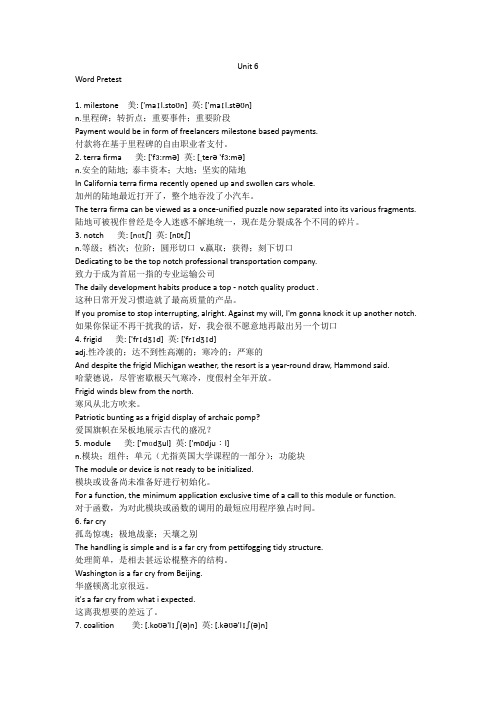
Unit 6Word Pretest1. milestone 美: ['maɪl.stoʊn] 英: ['maɪl.stəʊn]n.里程碑;转折点;重要事件;重要阶段Payment would be in form of freelancers milestone based payments.付款将在基于里程碑的自由职业者支付。
2. terra firma 美: ['fɜ:rmə] 英: [ˌterə 'fɜ:mə]n.安全的陆地; 泰丰资本;大地;坚实的陆地In California terra firma recently opened up and swollen cars whole.加州的陆地最近打开了,整个地吞没了小汽车。
The terra firma can be viewed as a once-unified puzzle now separated into its various fragments. 陆地可被视作曾经是令人迷惑不解地统一,现在是分裂成各个不同的碎片。
3. notch 美: [nɑtʃ] 英: [nɒtʃ]n.等级;档次;位阶;圆形切口v.赢取;获得;刻下切口Dedicating to be the top notch professional transportation company.致力于成为首屈一指的专业运输公司The daily development habits produce a top - notch quality product .这种日常开发习惯造就了最高质量的产品。
If you promise to stop interrupting, alright. Against my will, I'm gonna knock it up another notch. 如果你保证不再干扰我的话,好,我会很不愿意地再敲出另一个切口4. frigid 美: ['frɪdʒɪd] 英: ['frɪdʒɪd]adj.性冷淡的;达不到性高潮的;寒冷的;严寒的And despite the frigid Michigan weather, the resort is a year-round draw, Hammond said.哈蒙德说,尽管密歇根天气寒冷,度假村全年开放。
英语泛读教程3__课文翻译 完整版
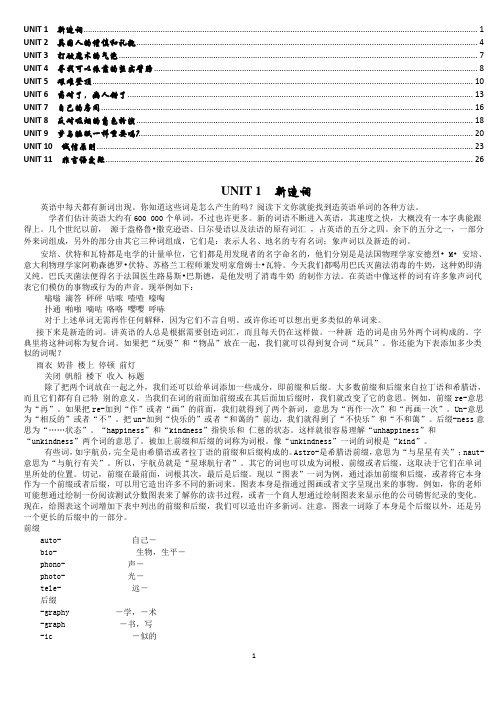
UNIT 1 新造词 (1)UNIT 2 英国人的谨慎和礼貌 (4)UNIT 3 打破魔术的气泡 (7)UNIT 4 寻找可以依靠的坚实臂膀 (8)UNIT 5 艰难登顶 (10)UNIT 6 药对了,病人错了 (13)UNIT 7自己的房间 (16)UNIT 8 反对吸烟的角色扮演 (18)UNIT 9 梦与睡眠一样重要吗? (20)UNIT 10 诚信原则 (23)UNIT 11 非言语交际 (26)UNIT 1新造词英语中每天都有新词出现。
你知道这些词是怎么产生的吗?阅读下文你就能找到造英语单词的各种方法。
学者们估计英语大约有600 000个单词,不过也许更多。
新的词语不断进入英语,其速度之快,大概没有一本字典能跟得上。
几个世纪以前,源于盎格鲁•撒克逊语、日尔曼语以及法语的原有词汇,占英语的五分之四。
余下的五分之一,一部分外来词组成,另外的部分由其它三种词组成,它们是:表示人名、地名的专有名词;象声词以及新造的词。
安培、伏特和瓦特都是电学的计量单位,它们都是用发现者的名字命名的,他们分别是是法国物理学家安德烈• M•安培、意大利物理学家阿勒森德罗•伏特、苏格兰工程师兼发明家詹姆士•瓦特。
今天我们都喝用巴氏灭菌法消毒的牛奶,这种奶即清又纯。
巴氏灭菌法便得名于法国医生路易斯•巴斯德,是他发明了消毒牛奶的制作方法。
在英语中像这样的词有许多象声词代表它们模仿的事物或行为的声音。
现举例如下:嗡嗡滴答砰砰咕哝喳喳嚎啕扑通啪啪嘀咕咯咯嘤嘤呼哧对于上述单词无需再作任何解释,因为它们不言自明。
或许你还可以想出更多类似的单词来。
接下来是新造的词。
讲英语的人总是根据需要创造词汇,而且每天仍在这样做。
一种新造的词是由另外两个词构成的。
字典里将这种词称为复合词。
如果把“玩耍”和“物品”放在一起,我们就可以得到复合词“玩具”。
你还能为下表添加多少类似的词呢?雨衣奶昔楼上停顿前灯关闭帆船楼下收入标题除了把两个词放在一起之外,我们还可以给单词添加一些成分,即前缀和后缀。
泛读教程 第三册 cloze 答案 原文

Unit1。
The ability to predict what the writer is going/ about/ trying to say next is both an aid to understanding and a sign of it.A prediction begins from the moment you read the title and from expectations of what he book is likely to contain。
Even if the expectations/predictions are contradicted, they are useful because they have started you thinking about the topic and made you actively involved。
If you formulate your predictions as questions which you think the text may answer, you are preparing yourself to read for a purpose: to see which of your questions are in fact dealt with and what answers are offered。
If your reading is more purposeful you are likely to understand better.Naturally your predictions/expectations will not always be correct。
This does not matter at all as long as you recognize when they are wrong, and why. In fact mistaken predictions can tell you the source of misunderstanding and help you to avoid certain false assumptions。
大学英语泛读3 Unit 6

Unit 6
Blue Jeans
Fast reading exercises
•
Culture is one of the most challenging elements of the international marketplace. This system of learned behavior patterns characteristic of the members of a given society is constantly shaped by a set of dynamic variables: language, religion, values and attitudes, manners and customs, aesthetics, technology, education, and social institutions. To cope with this system, an international manager needs both factual and interpretive knowledge of culture. To some extent, the factual knowledge can be learned; its interpretation comes only through experience.
• 在二战之前出生的美国人较为传统,被称 为Silent Generation(沉静的一代)。二战 后的美国百废待兴,很多男性从战场返乡, 结婚生子,创造了美国史无前例的baby boom(婴儿潮),而在此期间出生的孩子 则被称为baby boomer(婴儿潮世代)。 人们将战后新生活的希望寄托在baby boomers身上,因此他们从小就受到良好的 教育,长大之后在美国诸多领域挑大梁。 而目前baby boomers大都面临退休,使社 会养老负担加重。
英语泛读教程3第三册Unit6课文翻译

UNIT6药对了,病人错了通常,药房的职业水平和权威是很少受到怀疑的。
然而,药房的出错率比人们所想的要高得多。
想一想,要是药房给你开错了药会出现什么后果?下面这篇文章将会告诉我们更多有关药房错误的事情。
当天,即1995年2月21日的晚些时候,在急救室里,医生们发现小女孩服用的根本不是利他林,而是大剂量的格里纳斯,一种治疗糖尿病的药。
次年在法庭上,亨德黎的律师论证说,药物没有正确配发,其剂量比成人正常初服量高出16倍,使得加布里埃尔血糖急遽攀高,从而导致她脑部永久性损伤。
陪审团判决赔偿亨德黎家1600万美元。
日特爱德药店提出了上诉。
药房交易看上去非常简单明了。
它们的出错率有多高呢?尽管没有确定的全国性统计数据,还是有证据表明配药错误比人们想象的要更常见。
1997年,行业刊物《药学信息》在全国范围内进行的一次调查表明,53%的药剂师承认在前两月里发生过差错。
1996年6月对3361位加利福尼亚和俄勒冈的药剂师的调查显示,出错率为每家药店每年324次——将近每天1次。
“十年前,可接受的出错率为每家药店每年1次,”拉尔夫·沃格尔说。
他是专业药剂师协会的主席,这家协会拥有2000名药剂师。
“我们今天看到的却是由于人员配备不足以及配药业出现的一些新的压力所造成的混乱局面。
”配药业坚决认为,对出错率的担忧被过分渲染。
不过,有许多州的管理者、消费者权益维护者和药剂师们认为,由于工作量增加,一场零售药业的革命正在引起诸多问题。
他们指出了两点:一、处方总量在不断增长——1992年到1997年增长了30%,这是卫生保健信息公司“IMS Health”所调查的结果。
二、由保险公司或卫生维护组织支付的处方百分比已由1991年的28%增长到1997年的60%。
这些第三方付款者使配药业得到的付还率持续走低,这必然造成为保持利润增长而大量配药。
甚至四大连锁药房——日特爱德公司,CVS,爱克德以及沃尔格林斯——也受到了影响。
新世纪泛读教程3Unit 6

Find the identical unit as quickly as you can and cross it out.
8. igh A. gih B. igh C. ihg D. lgh E. hig 9. wea A. wer B. wae C. mea D. nea E. wea 10. jlg A. jig B. jgl C. jlg D. gil E. jlp 11. fan A. fah B. fan C. far D. fen E. feh 12. pce A. pee B. pec C. poe D. pce E. bce 13. ous A. ons B. ous C. uos D. ouz E. aus 14. rth A. trh B. rtn C. cth D. trn E. rth 15. eky A. cky B. ekg C. chy D. eky E. ckg
7. The SpaceShipOne flights show that ________. A. space tourism will be possible in the future B. spacecraft designed by private companies will be better than government-designed ones C. human spaceflight will not be the exclusive province of government agencies for too long
Scan the text and then answer the following questions.
8. SpaceX officials have said that Dragon ________. A. will shuttle astronauts in a few months B. will make at least 11 flights before carrying astronauts around C. are not made for manned missions
新教材高中英语Unit6泛读技能初养成学案外研版选择性必修第三册

新教材高中英语学案外研版必修第三册:Unit 6 Nature in words阅读P68-69教材中的材料,选择最佳答案。
1.What does“lines” mean in the second paragraph?A.A long thin mark. B.A group of words.C.An imaginary border. D.A remark.2.Which kind of person is Rachel Carson except ?A.thorough B.responsibleC.determined D.emotional3.The text is a(n) .A.science report B.book reviewC.science fiction D.autobiography4.Which of the following is not true about Silent Spring?A.It contains a lot of scientific research.B.The language is beautiful and elegant.C.It was a milestone in the green movement.D.It was well received by everyone.[答案] 1-4 BDBDWords and Phrases知识要点1dozen number一打;许多(教材P69)The book also gives dozens of other examples of eradication programmes that did nothing to reduce the problems they were originally designed to solve.该书还列举了许多其他的实例来说明一些根除方案根本没有采取任何措施来减少它们原本要解决的问题。
新视野大学英语第三版读写教程第三册UNIT6课文及翻译(A+B篇)
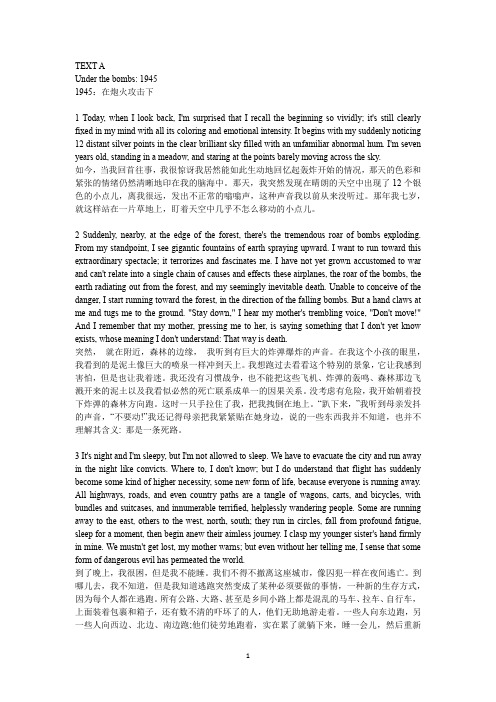
TEXT AUnder the bombs: 19451945:在炮火攻击下1 Today, when I look back, I'm surprised that I recall the beginning so vividly; it's still clearly fixed in my mind with all its coloring and emotional intensity. It begins with my suddenly noticing 12 distant silver points in the clear brilliant sky filled with an unfamiliar abnormal hum. I'm seven years old, standing in a meadow, and staring at the points barely moving across the sky.如今,当我回首往事,我很惊讶我居然能如此生动地回忆起轰炸开始的情况,那天的色彩和紧张的情绪仍然清晰地印在我的脑海中。
那天,我突然发现在晴朗的天空中出现了12个银色的小点儿,离我很远,发出不正常的嗡嗡声,这种声音我以前从来没听过。
那年我七岁,就这样站在一片草地上,盯着天空中几乎不怎么移动的小点儿。
2 Suddenly, nearby, at the edge of the forest, there's the tremendous roar of bombs exploding. From my standpoint, I see gigantic fountains of earth spraying upward. I want to run toward this extraordinary spectacle; it terrorizes and fascinates me. I have not yet grown accustomed to war and can't relate into a single chain of causes and effects these airplanes, the roar of the bombs, the earth radiating out from the forest, and my seemingly inevitable death. Unable to conceive of the danger, I start running toward the forest, in the direction of the falling bombs. But a hand claws at me and tugs me to the ground. "Stay down," I hear my mother's trembling voice, "Don't move!" And I remember that my mother, pressing me to her, is saying something that I don't yet know exists, whose meaning I don't understand: That way is death.突然,就在附近,森林的边缘,我听到有巨大的炸弹爆炸的声音。
英语专业 英语泛读3 第三册 教案
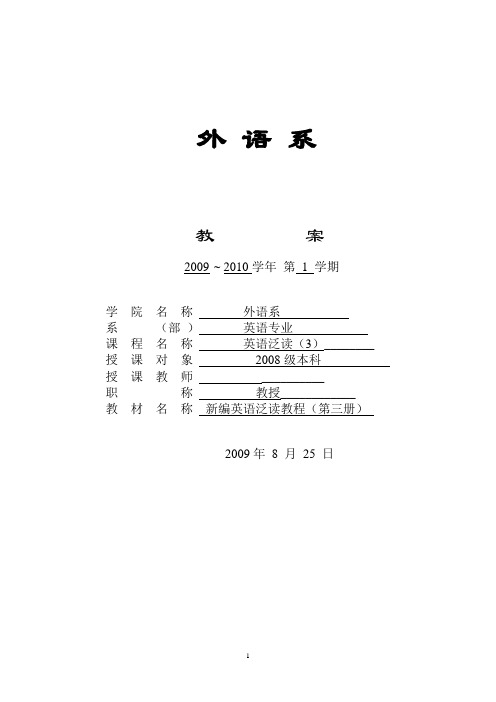
prompt to cause
rage to burn out of control
rap n. accusation charge
v. criticize
rock to shock; to surprise
rout defeat completely
row a quarrel
3.3.Read English novels
参考资料(含参考书、文献等,有章节教案的本项可不填):
1.1.新编英语教程参考答案(1-4册).上海外语教育出版社,2004.
2.2.Nuttall, C. Teaching Reading Skills in a Foreign Language [M].上海外语教育出版社,2002.
nab to capture
net to take possession of; capture
nod approval
office an important government position
opt choose; decide
oust take power away from
pact a solemn agreement
外语系
教案
_2009_~2010学年第1学期
学院名称外语系
系(部)英语专业
课程名称英语泛读(3)________
授课对象2008级本科
授课教师__________
职称教授____________
教材名称新编英语泛读教程(第三册)
2009年8月25日
保定学院课程教案(课时单元备课)
授课题目(或主题):Unit 1ReadingStrategies
- 1、下载文档前请自行甄别文档内容的完整性,平台不提供额外的编辑、内容补充、找答案等附加服务。
- 2、"仅部分预览"的文档,不可在线预览部分如存在完整性等问题,可反馈申请退款(可完整预览的文档不适用该条件!)。
- 3、如文档侵犯您的权益,请联系客服反馈,我们会尽快为您处理(人工客服工作时间:9:00-18:30)。
Unit 6 Right Drug, Wrong Patient2. Mastery of some language points3. Learning the possible dangers caused by pharmacy errors4. Learn safe ways to use alternative and complimentary medicines2.Explanation of some difficult words3. Learning the ways to avoid the possible dangers caused by pharmacy errorscaused by pharmacy errors2.Some words might cause difficulty in students’ understanding of the textAbout two periods of class will be used for the analysis and discussion of the passage itself.Total class hours: three periods1. Title:---Who is wrong? / Who is to blame for the pharmacy errors?2. Warming-up Questions(1)What would happen if the drug dispensed to you were not the proper one? Haveyou ever experienced such things?(2)If such things happened, who do you think is to blame?3. Information Related to the Text(1) IMS HealthIMS HEALTH is the world's leading provider of information solutions to the pharmaceutical and healthcare industries. With nearly 50 years of experience, they use leading-edge technologies to transform billions of pharmaceutical records collected from thousands of sources worldwide into valuable strategic insights for our clients.IMS HEALTH's market intelligence and analyses give customers the critical facts they need at every stage of the pharmaceutical life cycle - from the earliest stages of research and development through product launch, product maturation and patent expiration.With more than 5,000 professionals in 100 countries - from Austria to Australia - from China to Costa Rica - from Saudi Arabia to Senegal - IMS HEALTH is a trusted healthcare-industry strategic partner, with thousands of customers and annual revenue in 2001 of $1.3 billion.(2) U. S. PharmacopeiaIn pursuit of its mission to promote public health, USP establishes state-of-the-art standards to ensure the quality of medicines for human and veterinary use. USP also develops authoritative information about the appropriate use of medicines. National health care practitioner reporting programs support USP's standards and information programs. In addition, USP supports many public service programs.(3) Careers in medicine in the USTo become a medical doctor in the US, one must attend four years of college and receive a bachelor’s degree, followed by four years of medical school. Then he becomes an intern in a hospital and receives supervised practical training. As an intern, he has to “make rounds” with other doctors, visiting hospital patients. He is supposed to help give special treatments and answer emergency calls in the hopital at any time of day or night. Finally he becomes a resident at a hospital. Like the intern, he learns by observing the work of others. But the resident has much more responsibility than the intern. He often assists experienced surgeons during operations. In an emergency, he may take over the work of the staff surgeon.Internship and residency combined take three to five years, depending on one’s area of specialization. Hospitals have several interns and many residents on their staff. A resident who is completing his residency period and who thereby distinguished himself is selected to be chief resident, a position of greater responsibility.(4) Three types of doctors1. General practitioners 全科医生2. Specialists3. Researchers4. Text analysis(1)Article Abstract:Drug-dispensing errors are a common occurrence, requiring customers to be vigilant when having their prescriptions filled at pharmacies. These errors are attributed to understaffing and the consequent increase in workloads in the retail drug industry, coupled with rising prescription volume. Tips on how one's family can be protected from pharmacy errors are presented.(4)passage divisionPart I (para.1-8) By giving examples and providing statistics, the author pointout the seriousness of the drug dispensing errors.Part I (para.9-31) Some ways on how to protect you family and yourself.5. Key words and phrases(1) pharmacy error/drug dispensing error(2) prescription(3) dose(4) awry(5) churn out(6) be attributed to(7) fatal (8)medical vendor(9) submit to(10) oversight(11) counsel(12) pharmacist(13) adverse effect(14) dearth6. Language Notes1. The new prescription that her mother, Peggie, had gotten filled at the Rite Aid in Rock Hill, S.C., was for Ritalin, a drug used to treat attention deficit-hyperactivity disorder.(新处方上开的药是"利他林",这是她母亲佩吉在南卡罗来纳州洛克山的"莱特相助"药店配的药,一种用来治疗注意力亢奋/不足的药。
